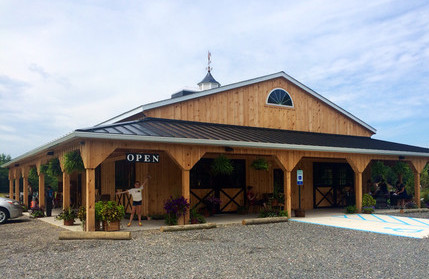
CASE STUDY: Cecil Creek Farm
Guiding a Dream
The vision for Cecil Creek Farm came to Bill and Megan Bumbernick during a 2012 family road trip that included a month-long stay in California. The trip was made possible after Bill sold his business the year before. This sale also allowed the Bumbernick’s to fulfill a long-standing dream of purchasing a 42-acre property across the street from the Bumbernick’s South Jersey home that Bill used as hunting grounds, and that Megan played in as a young girl. The sale provided the opportunity to resell to developers, or develop 22 housing lots themselves. But deep down, the Bumbernick’s knew that they wanted to live on the land.
California Dreaming
When they embarked, they had not made a final decision on what to do with the property. But their trip to California sparked a new idea. In many stops along the way, the Bumbernick’s encountered very tight knit farming communities that were being supported by the concept of Community Supported Agriculture (CSA). Megan recalls one such stop in Santa Barbara.
“What I saw was nothing like what I thought we had in South Jersey. As a mom, I’ve driven all the way to Delaware just to go to the closest Trader Joe’s to get fresh produce for my family. A CSA seemed to be exactly what my community and I needed.”
After another stop at a Rodeo in San Antonio, the Bumbernick’s returned to New Jersey with a new vision—to open a CSA and horse farm in their community. In the brutal winter of 2014, they founded Cecil Creek Farm, named after Megan’s father.
Building the Dream
The only problem with this plan was that Bill’s background in tech and Megan’s upbringing around kids from farming families did not qualify them to start a farm. So the first step was finding a farmer. Through mutual friends, they met Mark Tobin. Mark was apprenticing on a farm and was ready to become a manager. Mark and Bill began to work together tilling the land, building greenhouses and starting seedlings. They also worked with Amish builders to construct a magnificent farm market structure to house an indoor market, CSA pickup and future activities on the farm.
Megan’s job was to handle the marketing, inventory for the market, and overall retail market management but she didn’t feel she had the knowledge to be successful right out of the gate. During a trip to the 2014 Philly Farm and Food Fest, Megan came across the Kitchen Table Consultants booth. Although Megan admits that she didn’t talk to anyone at the booth, she took business cards and pamphlets thinking, “This is exactly what I need.”
By May, the Bumbernick’s had begun selling CSA shares out of the barn, the market building was almost finished, and Megan was nervous. So she made the call to Jen Brodsky and Kitchen Table Consultants. “I explained to Jen my vision of wanting the aesthetics of the Reading Terminal with the quality and variety of the Fair Food Farm Stand,” explains Megan. “I asked a lot of questions and Jen told me that I was asking all the right ones. That gave me confidence.”
Refining the Dream
What impressed Megan so much was that a professional like Jen, with years of retail and food production experience and a consulting business that tended to work with established businesses, could work with someone so green. Immediately, Jen jumped right in and began building systems with Megan that were to become the foundation of a successful market and CSA. This process included all basic retail systems; everything from what food safe display bins to purchase, market layout, hiring and training the right team, identifying the right product mix, layering in CSA pickups, creating an overall customer experience and developing efficient inventory and scheduling systems. The climax of Jen’s guidance culminated in a 1,000-person opening day party that Jen completely managed, leaving Megan time to speak with her growing number of customers and enjoy the fruits of her labor.
And that number continues to grow. The Bumbernick’s started their first season with 50 CSA members. Today, there are almost 500 people on the wait list, with 250 shares being made available. Jen also encouraged Megan to rethink her retail market strategy, which was struggling due to slow traffic. Megan is now also using the market space for cooking demos, private parties and the dynamic “farm to fork dinners,” where Cecil Creek Farm teams up with an area chef to create intimate coursed dining experiences for people who value fresh, local produce.
Megan credits Jen and Kitchen Table Consultants with many things from refining the aesthetic of the market building to creating a strong staff that allows Megan to continue to spend time with her family as well as manage the farm. When asked if it was all worth it, Megan says, “We spent a significant amount starting this farm, but hiring Jen was one of the expenses that actually saved us money. It helped in the respect that we were not guessing as much as we could have without her. Jen speaks from experience, and that was the biggest help.”